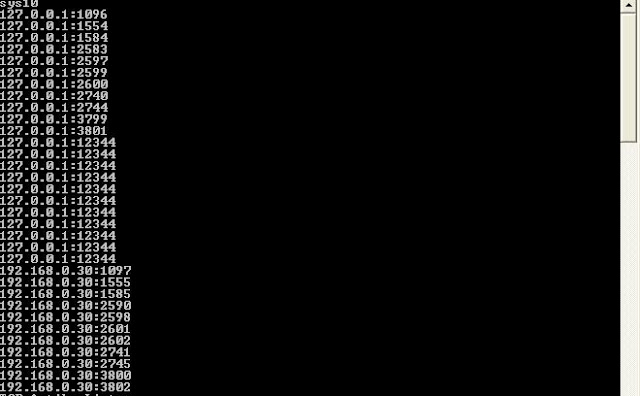Creating a Port Scanner in C#/List all occupied ports in a System
IPGlobalProperties gp=System.Net.NetworkInformation.IPGlobalProperties.GetIPGlobalProperties();
Console.WriteLine("Computer Name={0}",gp.HostName);
Console.WriteLine("TCP Active Listeners");
foreach (IPEndPoint ipe in gp.GetActiveTcpListeners())
{
Console.WriteLine(ipe.Address+"\t\t"+ipe.AddressFamily+"\t\t"+ipe.Port);
}
OUTPUT
IPGlobalProperties gp=System.Net.NetworkInformation.IPGlobalProperties.GetIPGlobalProperties();
Console.WriteLine("Computer Name={0}",gp.HostName);
Console.WriteLine("TCP Active Listeners");
foreach (IPEndPoint ipe in gp.GetActiveTcpListeners())
{
Console.WriteLine(ipe.Address+"\t\t"+ipe.AddressFamily+"\t\t"+ipe.Port);
}
OUTPUT
List Active Tcp Active Connections using C#
IPGlobalProperties gp=System.Net.NetworkInformation.IPGlobalProperties.GetIPGlobalProperties();
Console.WriteLine("Computer Name={0}",gp.HostName);
Console.WriteLine("TCP Active TCP Connections");
foreach(TcpConnectionInformation tci in gp.GetActiveTcpConnections())
{
Console.WriteLine(tci.LocalEndPoint.Address + "\t\t" + tci.LocalEndPoint.AddressFamily + "\t\t" + tci.LocalEndPoint.Port);
}
OUTPUT


No comments:
Post a Comment